[Canvas前端游戏开发]——FlappyBird详解
发布于 2016-01-04 01:48:54 | 199 次阅读 | 评论: 0 | 来源: 分享
Canvas iOS简化开发工具
Canvas是一款给设计者和开发者提供ios简化开发的工具,解决了曾经困扰设计者和开发者的难题。比如,设计者缺乏 objective-c 和 Xcode 的开发经验就很难开发iOS工具,或者是开发者很难使用合理的时间和代码做出真正简单的效果。
一直想自己做点小东西,直到最近看了本《HTML5游戏开发》,才了解游戏开发中的一点点入门知识。
本篇就针对学习的几个样例,自己动手实践,做了个FlappyBird,源码共享在度盘 ;也可以参考github,里面有更多的游戏样例。
游戏截图
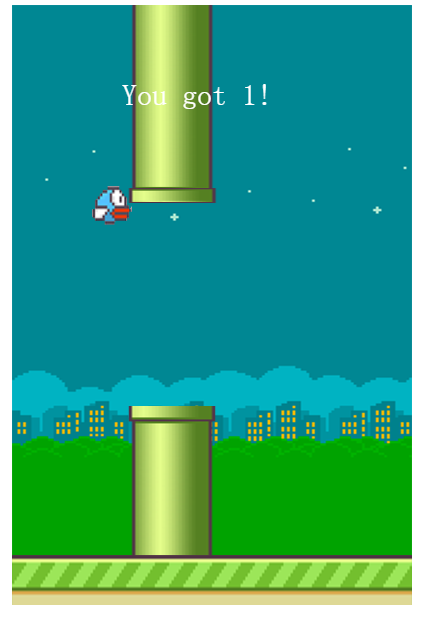
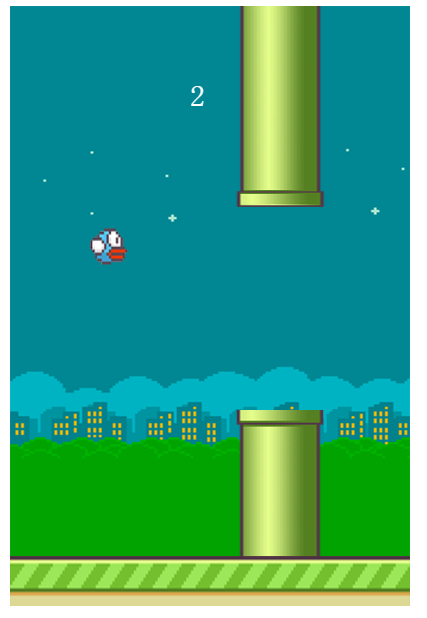
HTML5之Canvas
Canvas是Html5中用于绘图的元素,它可以绘制各种图形,比如长方形,多边形,圆形等等。如果想要了解Canvas的使用可以参考:
http://www.w3school.com.cn/tags/html_ref_canvas.asp
//如果想要使用canvas,首先需要获得上下文对象:
ctx = document.getElementById('canvas').getContext('2d');
//然后使用这个ctx绘制图形
在cavas每个绘制都是独立的操作。比如下图的两个绘制图形,第二个会以覆盖的形式绘制,因此绘制图形的顺序就显得十分重要了。
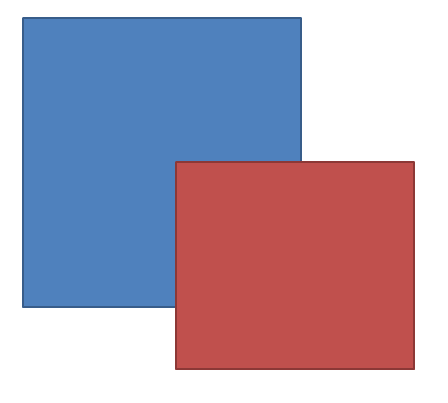
canvas之drawImage()
本篇的游戏开发中,主要使用的是依据图片绘制的api:drawImage(),它有两个基本的使用方法:
ctx.drawImage(image,this.bx,this.by,this.bwidth,this.bheight);
ctx.drawImage(image,x,y,width,height,this.px,this.py,this.pwidth,this.pheight);
第一个api中,指定Image对象,然后给出绘制图片的x,y坐标以及宽度和高度即可。
第二个api中,第一组x,y,width,height则指定了裁剪图片的坐标尺寸,这在使用多元素的矢量图时很常用。比如:
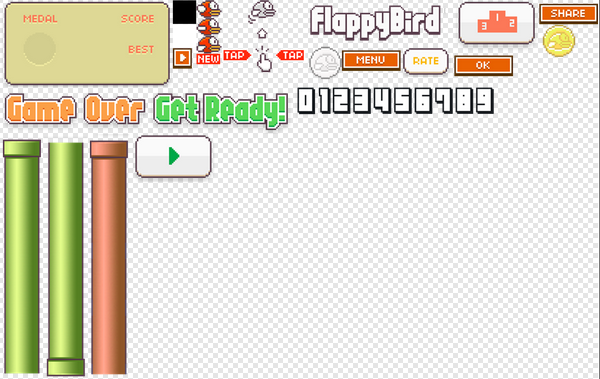
上面的图片中为了减少图片资源的请求数量,把很多的元素放在了一个图片中,此时就需要通过裁剪的方式,获取指定的图片元素。
FlappyBird原理解析
其实这个游戏很简单,一张图就可以看懂其中的奥妙:
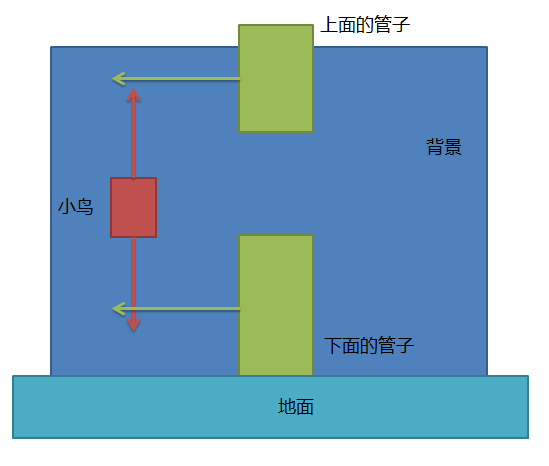
其中背景和地面是不动的。
小鸟只有上和下两个动作,可以通过控制小鸟的y坐标实现。
上下的管子只会向左移动,为了简单实现,游戏中一个画面仅仅会出现一对管子,这样当管子移出左边的背景框,就自动把管子放在最右边!
if(up_pipe.px+up_pipe.pwidth>0){
up_pipe.px -= velocity;
down_pipe.px -= velocity;
}else{
up_pipe.px = 400;
down_pipe.px = 400;
up_pipe.pheight = 100+Math.random()*200;
down_pipe.py = up_pipe.pheight+pipe_height;
down_pipe.pheight = 600-down_pipe.py;
isScore = true;
}
很简单吧!
由于该游戏一共就这几个元素,因此把他们都放入一个Objects数组中,通过setInteral()方法,在一定间隔时间内,执行一次重绘。
重绘的时候会先清除画面中的所有元素,然后按照新的元素的坐标一次绘制图形,这样就会出现移动的效果。
模拟小鸟重力
由于这个游戏不涉及小鸟横向的运动,因此只要模拟出小鸟下落的动作以及上升的动作就可以了。
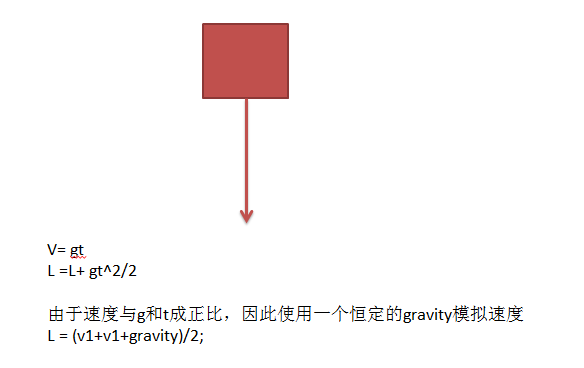
上升:这个很简单,只要把小鸟的y坐标减去一定的值就可以了
下落:其实重力不需要使用gt^2来模拟,可以简单的指定两个变量,v1和gravity,这两个变量与setInterval()中的时间共同作用,就能模拟重力。
ver2 = ver1+gravity;
bird.by += (ver2+ver1)*0.5;
碰撞检测
游戏中小鸟碰到管子或者地面都会算游戏结束:
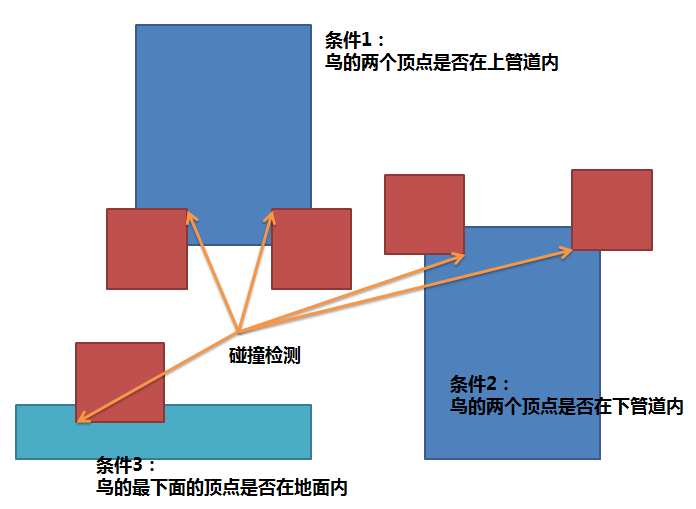
其中条件1上管道的检测为:
((bird.bx+bird.bwidth>up_pipe.px)&&(bird.by>up_pipe.py)&&(bird.bx+bird.bwidth<up_pipe.px+up_pipe.pwidth)&&(bird.by<up_pipe.py+up_pipe.pheight))||
((bird.bx+bird.bwidth>up_pipe.px)&&(bird.by>up_pipe.py)&&(bird.bx+bird.bwidth<up_pipe.px+up_pipe.pwidth)&&(bird.by<up_pipe.py+up_pipe.pheight))
条件2下管道的检测为:
((bird.bx>down_pipe.px)&&(bird.by>down_pipe.py)&&(bird.bx<down_pipe.px+down_pipe.pwidth)&&(bird.by<down_pipe.py+down_pipe.pheight))||
((bird.bx>down_pipe.px)&&(bird.by+bird.bheight>down_pipe.py)&&(bird.bx<down_pipe.px+down_pipe.pwidth)&&(bird.by+bird.bheight<down_pipe.py+down_pipe.pheight))
条件3地面的检测最简单,为:
bird.by+bird.bheight>ground.bgy
如果满足这三个条件,就算游戏结束,会清除循环以及提示游戏结束信息。
分数计算
分数的计算与碰撞检测类似,设置一个开关,当管子重新出现时,设置为true。当分值加1时,设置为false。
小鸟的最左边的x坐标如果超出了管子的x+width,就认为成功通过。
if(isScore && bird.bx>up_pipe.px+up_pipe.pwidth){
score += 1;
isScore = false;
if(score>0 && score%10 === 0){
velocity++;
}
}
通过后,分值加1,速度+1。
全部源码
<!DOCTYPE html>
<html>
<head>
<title>Flappy Bird</title>
<meta http-equiv="Content-Type" content="text/html; charset=utf-8" />
<script type="text/javascript">
// Edit by xingoo
// Fork on my github:https://github.com/xinghalo/CodeJS/tree/master/HTML5
var ctx;
var cwidth = 400;
var cheight = 600;
var objects = [];
var birdIndex = 0;
var ver1 = 10;
var ver2;
var gravity = 2;
var pipe_height = 200;
var velocity = 10;
var tid;
var score = 0;
var isScore = false;
var birds = ["./images/0.gif","./images/1.gif","./images/2.gif"];
var back = new Background(0,0,400,600,"./images/bg.png");
var up_pipe = new UpPipe(0,0,100,200,"./images/pipe.png");
var down_pipe = new DownPipe(0,400,100,200,"./images/pipe.png");
var ground = new Background(0,550,400,200,"./images/ground.png");
var bird = new Bird(80,300,40,40,birds);
objects.push(back);
objects.push(up_pipe);
objects.push(down_pipe);
objects.push(ground);
objects.push(bird);
function UpPipe(x,y,width,height,img_src){
this.px = x;
this.py = y;
this.pwidth = width;
this.pheight = height;
this.img_src = img_src;
this.draw = drawUpPipe;
}
function DownPipe(x,y,width,height,img_src){
this.px = x;
this.py = y;
this.pwidth = width;
this.pheight = height;
this.img_src = img_src;
this.draw = drawDownPipe;
}
function drawUpPipe(){
var image = new Image();
image.src = this.img_src;
ctx.drawImage(image,150,500,150,800,this.px,this.py,this.pwidth,this.pheight);
}
function drawDownPipe(){
var image = new Image();
image.src = this.img_src;
ctx.drawImage(image,0,500,150,500,this.px,this.py,this.pwidth,this.pheight);
}
function Background(x,y,width,height,img_src){
this.bgx = x;
this.bgy = y;
this.bgwidth = width;
this.bgheight = height;
var image = new Image();
image.src = img_src;
this.img = image;
this.draw = drawbg;
}
function drawbg(){
ctx.drawImage(this.img,this.bgx,this.bgy,this.bgwidth,this.bgheight);
}
function Bird(x,y,width,height,img_srcs){
this.bx = x;
this.by = y;
this.bwidth = width;
this.bheight = height;
this.imgs = img_srcs;
this.draw = drawbird;
}
function drawbird(){
birdIndex++;
var image = new Image();
image.src = this.imgs[birdIndex%3];
ctx.drawImage(image,this.bx,this.by,this.bwidth,this.bheight);
}
function calculator(){
if(bird.by+bird.bheight>ground.bgy ||
((bird.bx+bird.bwidth>up_pipe.px)&&(bird.by>up_pipe.py)&&(bird.bx+bird.bwidth<up_pipe.px+up_pipe.pwidth)&&( bird.by<up_pipe.py+up_pipe.pheight))||
((bird.bx+bird.bwidth>up_pipe.px)&&(bird.by>up_pipe.py)&&(bird.bx+bird.bwidth<up_pipe.px+up_pipe.pwidth)&&( bird.by<up_pipe.py+up_pipe.pheight))||
((bird.bx>down_pipe.px)&&(bird.by>down_pipe.py)&&(bird.bx<down_pipe.px+down_pipe.pwidth)&&(bird.by<down_pipe.py+down_pipe.pheight))||
((bird.bx>down_pipe.px)&&(bird.by+bird.bheight>down_pipe.py)&&(bird.bx<down_pipe.px+down_pipe.pwidth)&&(bird.by+bird.bheight<down_pipe.py+down_pipe.pheight))){
clearInterval(tid);
ctx.fillStyle = "rgb(255,255,255)";
ctx.font = "30px Accent";
ctx.fillText("You got "+score+"!",110,100)
return;
}
ver2 = ver1+gravity;
bird.by += (ver2+ver1)*0.5;
if(up_pipe.px+up_pipe.pwidth>0){
up_pipe.px -= velocity;
down_pipe.px -= velocity;
}else{
up_pipe.px = 400;
down_pipe.px = 400;
up_pipe.pheight = 100+Math.random()*200;
down_pipe.py = up_pipe.pheight+pipe_height;
down_pipe.pheight = 600-down_pipe.py;
isScore = true;
}
if(isScore && bird.bx>up_pipe.px+up_pipe.pwidth){
score += 1;
isScore = false;
if(score>0 && score%10 === 0){
velocity++;
}
}
ctx.fillStyle = "rgb(255,255,255)";
ctx.font = "30px Accent";
if(score>0){
score%10!==0?ctx.fillText(score,180,100):ctx.fillText("Great!"+score,120,100);
}
}
function drawall(){
ctx.clearRect(0,0,cwidth,cheight);
var i;
for(i=0;i<objects.length;i++){
objects[i].draw();
}
calculator();
}
function keyup(e){
var e = e||event;
var currKey = e.keyCode||e.which||e.charCode;
switch (currKey){
case 32:
bird.by -= 80;
break;
}
}
function init(){
ctx = document.getElementById('canvas').getContext('2d');
document.onkeyup = keyup;
drawall();
tid = setInterval(drawall,80);
}
</script>
</head>
<body onLoad="init();">
<canvas id="canvas" width="400" height="600" style="margin-left:200px;">
Your browser is not support canvas!
</canvas>
</body>
</html>
总结
在学习游戏开发的时候,我突然怀念起大学的物理。当时很纳闷,学计算机学什么物理,后来再接触游戏开发才知道,没有一定的物理知识,根本无法模拟游戏中的各个场景。
而通过这个简单的小游戏,也捡起来了很多旧知识。
参考
【1】:Canvas参考手册
【2】:《HTML5游戏开发》
【3】:EdisonChou的FlappyBird